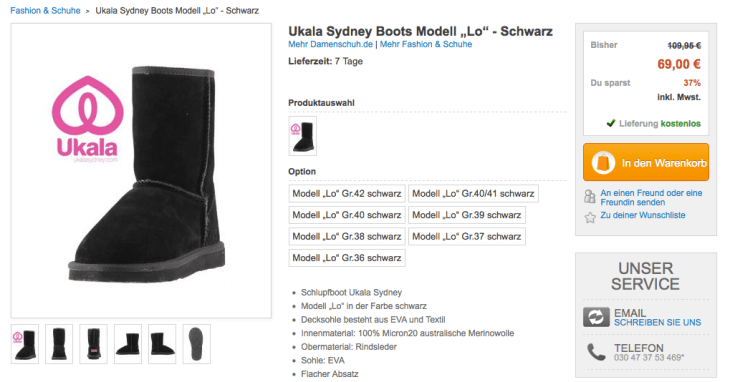When Groupon was gearing up for its IPO last year, there was a lot of talk about whether the company would be able to sustain its business on a diet that mainly consisted of daily deals. Today, a little sign of what Groupon might be cooking up for its next course.
Over in Germany, Groupon has launched a new site, Groupon Deals, an Amazon-like storefront that sells a range of goods, from boots to bodysuits.
Like Groupon’s mainstay-daily deals, the products are being sold at big discounts, of up to 70 percent on some items. Unlike the daily deals, these products do not have timeouts on buying them.
According to the site, Groupon Deals offers consumers a “complete shopping experience,” although at the moment, the selection of goods on offer is pretty small. That points to this being a local experiment more than anything else for now.
But even so, it is already starting to market the service in some form: A reader tells us that offers from Groupon Deals started appearing in his Facebook feed earlier today.
It is unclear at this point whether this is something that Groupon is planning on offering only in Germany, or whether it intends to roll out similar storefronts in other regions, which currently serve 33 million active users.
We have contacted Groupon to ask questions and will update this post as we learn more. Update: Groupon’s director of communications, Julie Mossler, said in an email: “We’re testing a new site design for Germany and based on customer and merchant feedback we’ll evaluate how to move forward.”
Extending out its services to a more conventional model of selling goods online is not exactly disruptive and cutting-edge, but it is probably also a natural move for Groupon: the company already has extensive relationships with retailers and brands for its time-based daily deals, which cover not only events and services, but a range of physical products, too. Each product on the site comes with a list of “supplier details”: that might mean Groupon has a platform for third parties to upload products for sale.
It also puts Groupon even more directly in competition with the likes of more established players like Amazon and eBay, to mention nothing of more local online retailing operations.
International is a division where Groupon is focusing hard, but at a price. In the company’s Q4 earnings reported last week, Groupon reported a loss of $350 million, with $137 million of that attributable to international expansion costs.
Groupon’s European operation was kick-started back in May 2010, when it bought Germany-based competitor Citydeal for an undisclosed sum. At that time Citydeal was already active in several European markets.
